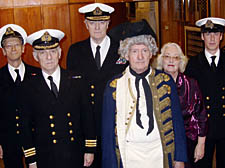|
|
 |
| |

From left, Judge Peter Cowell, barrister Frank Abbott, part-time judge Nigel Pascoe, Anthony Arlidge QC, Elizabeth Pascoe and barrister Richard Tutt |
The verdict: a triumph for the law
Judges and QCs ditch wigs for roles in stage reconstruction of admiral’s court martial
RUMPOLE of the Bailey would have had something to say about judges and QCs swapping wig and gown for naval costume to appear in a play. “Have m’learned friends taken leave of their senses?” he might have grumbled.
But The Court Martial of Admiral Byng would surely have won over the old legal hack, the creation of dramatist John Mortimer. The play deals with the true story of one of Britain’s greatest military injustices, when the commander of the British fleet, Byng, was executed by firing squad for cowardice.
The play’s cast, all leading members of the bar, with criminal barrister Anthony Arlidge QC as Byng, received tumultuous applause from a packed audience when they performed the play at Temple Church, off Fleet Street. Among those taking a bow at the end was Judge Peter Cowell, a former member of Cambridge Footlights.
Byng was made a national scapegoat by politicians in 1757. He was court martialed for refusing to attack the French navy off the island of Minorca – in those days the equivalent of today’s Falkland Islands – on the grounds that he was ill equipped and feared a pointless bloodbath and waste of British lives.
Written by eminent QC and part-time judge, Nigel Pascoe, Byng is based on transcripts from the court martial and has resonances for today. Mr Pascoe said: “If we had lost the Falklands war, would it have been the politicians or the military leaders who would have got the blame? Notice also how today’s military in Afghanistan are warning our politicians that they must have proper equipment if they are ever going to overwhelm the enemy.”
Mr Pascoe believes that history has shown that Byng made a sensible tactical decision. He added: “Byng had been sent off to relieve Minorca, which had been overrun by the French. He decided it was completely impossible and chose not to try and engage the enemy.
“He also had other responsibilities, including protecting Gibraltar.”
The play begins in the present day with a narrator giving a Dartmouth Naval College lecture about the history of the case, which then merges into the court martial of Byng. “I was attracted to the story because it was a famous trial,” Mr Pascoe said. “But when I read Byng’s own proof of evidence I was very moved. It was superb. It is the proof of a really intelligent man. It was a coherent argument which makes so much sense even today.”
Mr Pascoe, who directs and appears in the piece, chose the actors because he could “hear their voices” and thought they would be perfect for their parts.
“For example, Tony Arlidge is one of the country’s very best criminal lawyers and is also a superb actor,” he said.
Mr Arlidge, who appeared for the prosecution at the trial of Jeremy Bamber in the Farmhouse Massacre case in 1986, described the play as a “tragedy of political incorrectness”.
He revealed that, in his youth, he had acted at Cambridge alongside actors Ian McKellen and Derek Jacobi, and director Trevor Nunn. “I even thought about going into the theatre,” he said. “But then I thought I’d be safer with the law.”
He said of Byng’s situation: “It is actually the King, bowing to popular demand, who effectively calls for the death penalty to be carried out, even though the trial judges recommended mercy.”
Barrister Frank Abbott, who plays a prosecutor at the court martial, said. “You can’t help but gasp at the way poor old Byng was treated. He got the blame for not dying a hero’s death, which is what the politicians wanted him to do.”
Mr Pascoe is currently looking for backers for The Bentley Boys, a film script about racing cars in the 1920s. |
 |
|
 |
| |
| |
| |
|
 |
|